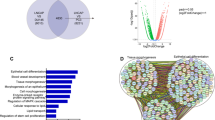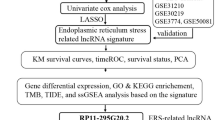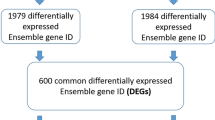Abstract
Biological and mechanistic relevance of intergenic disease-associated genetic loci (IDAGL) containing highly statistically significant disease-linked SNPs remains unknown. Here we present the experimental and clinical evidence revealing important role of IDAGL in human diseases. Targeted RT-PCR screen coupled with sequencing of purified PCR products detects widespread transcription at multiple intergenic disease-associated genomic loci (IDAGL) and identifies 96 small non-coding trans-regulatory RNAs of ~ 100-300 nt in length containing SNPs associated with 21 common human disorders (snpRNAs). Functionality of snpRNAs is supported by multiple independent lines of experimental evidence demonstrating their cell-type-specific expression and evolutionary conservation of sequences, genomic coordinates, and biological effects. Analysis of chromatin state signatures, expression profiling experiments using microarray and Q-PCR technologies, and luciferase reporter assays indicate that many IDAGL are Polycomb-regulated long-range enhancers. Expression of snpRNAs in human and mouse cells markedly affects cellular behavior and induces allele-specific clinically-relevant phenotypic changes: NLRP1-locus snpRNAs exert regulatory effects on monocyte/macrophage trans-differentiation, induce prostate cancer (PC) susceptibility snpRNAs, and transform low-malignancy hormone-dependent human PC cells into highly malignant androgen-independent PC. Q-PCR analysis and luciferase reporter assays demonstrate that snpRNA sequences represent allele-specific “decoy” targets of microRNAs which function as SNP-allele-specific modifiers of microRNA expression and activity. We demonstrate that trans-acting RNA molecules facilitating androgen depletion-independent growth (ADIG) in vitro and castration-resistant (CR) phenotype in vivo of PC contain intergenic 8q24-locus SNP variants which were recently linked with increased risk of developing PC. Expression level of 8q24-locus PC susceptibility snpRNAs is regulated by NLRP1-locus snpRNAs, which are transcribed from the intergenic long-range enhancer sequence located in 17p13 region at ~ 30 kb distance from the NLRP1 gene. Q-PCR analysis of clinical PC samples reveals markedly increased snpRNA expression levels in tumor tissues compared to the adjacent normal prostate [122-fold and 45-fold in Gleason 7 tumors (p = 0.03); 370-fold and 127-fold in Gleason 8 tumors (p = 0.0001); for NLRP1-locus and 8q24-locus SnpRNAs, respectively]. Highly concordant expression profiles of the NLRP1-locus snpRNAs and 8q24 CR-locus snpRNAs (r = 0.896; p < 0.0001) in clinical PC samples and experimental evidence of trans-regulatory effects of NLRP1-locus snpRNAs on expression of 8q24-locus SnpRNAs indicate that ADIG and CR phenotype of human PC cells can be triggered by RNA molecules transcribed from the NLRP1-locus intergenic enhancer and down-stream activation of the 8q24-locus snpRNAs. Our results define the intergenic NLRP1 and 8q24 regions as regulatory loci of ADIG and CR phenotype of human PC, reveal previously unknown molecular links between the innate immunity/inflammasome system and development of hormone-independent PC, and identify novel diagnostic and therapeutic targets exploration of which should be highly beneficial for clinical management of PC.
Similar content being viewed by others
Article PDF
Author information
Authors and Affiliations
Corresponding author
Rights and permissions
About this article
Cite this article
Sell, S., Buttyan, R., Glinsky, G. et al. Networks of intergenic long-range enhancers and snpRNAs drive castration-resistant phenotype of prostate cancer and contribute to pathogenesis of multiple common human disorders. Nat Prec (2011). https://doi.org/10.1038/npre.2011.6069.1
Received:
Accepted:
Published:
DOI: https://doi.org/10.1038/npre.2011.6069.1



